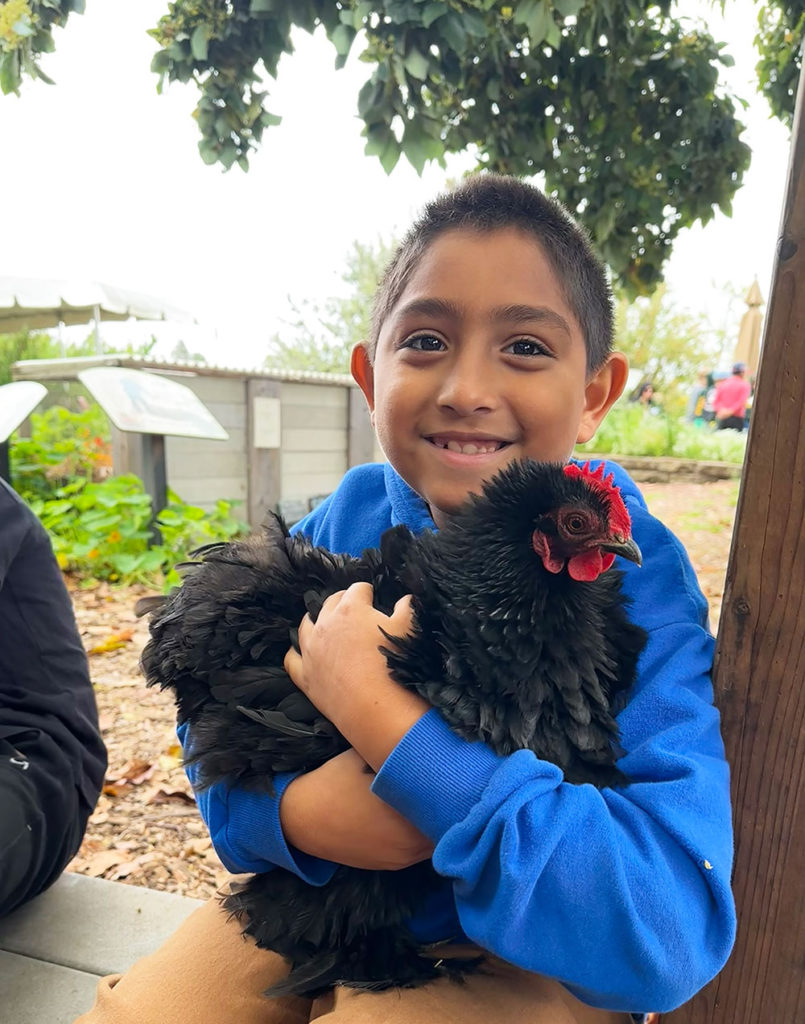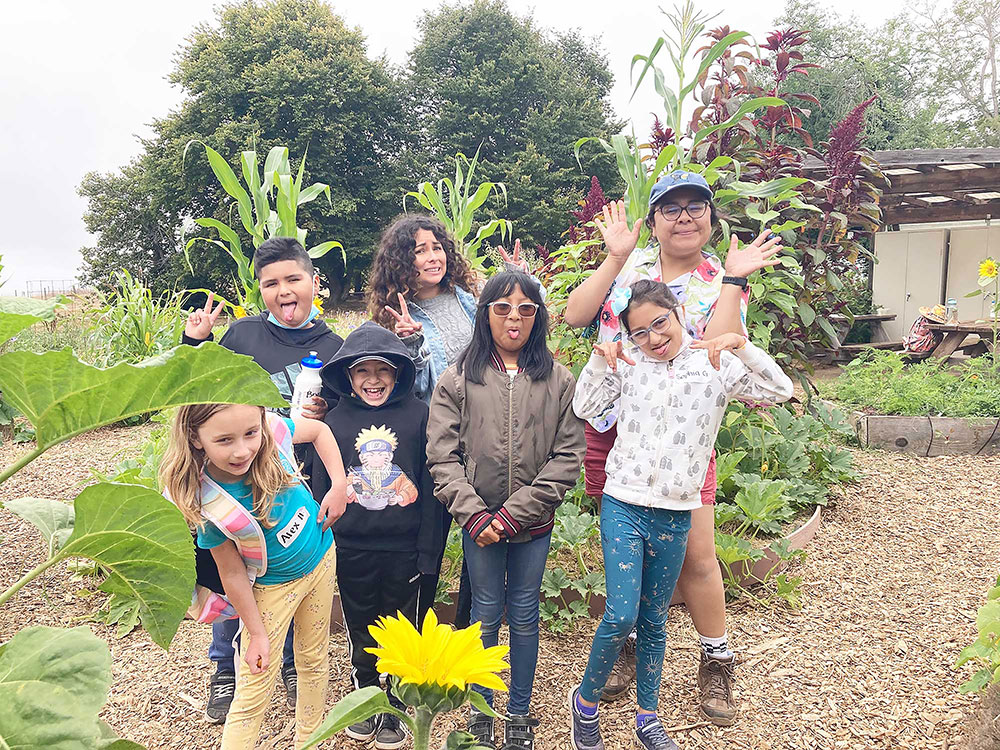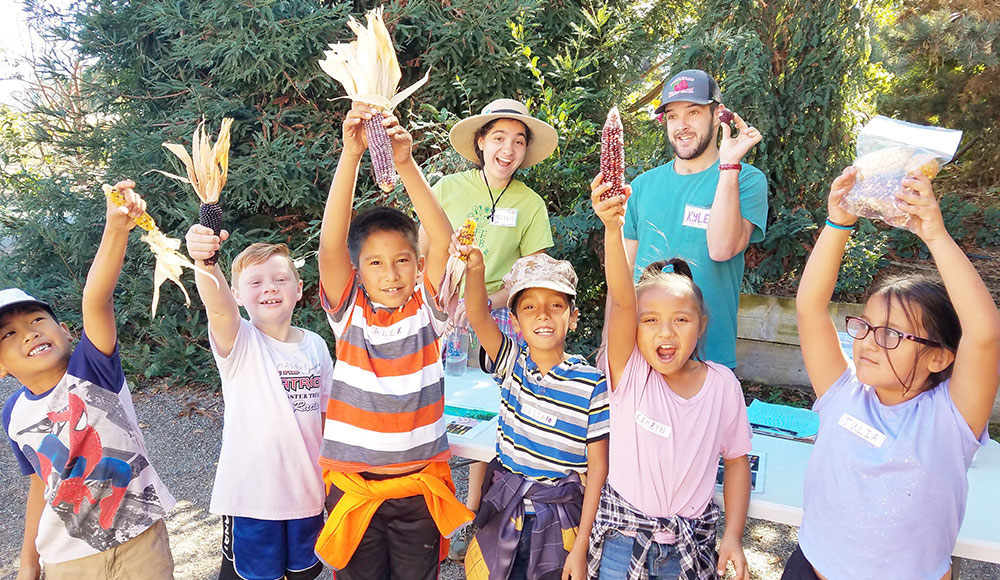Unlike many of Northern California’s most groundbreaking ideas, this one skipped the garage in favor of a parking lot. In the late 1970s, before the rise of Silicon Valley startups, a small group of educators from the Live Oak School District came together to transform an abandoned parking lot at Green Acres Elementary School into a vibrant, thriving garden.
That marked the beginning of Life Lab—one of the 63 organizations to which Good Times readers can donate during Santa Cruz Gives.
The founders envisioned the gardens as living laboratories where students could go beyond studying science to making hands-on discoveries, just like real scientists. This concept inspired the name Life Lab, reflecting the idea of a garden as a living laboratory. This visionary approach laid the foundation, and it continues to grow and evolve over the years.
Life Lab Executive Director Whitney Cohen, who joined the organization in 2007 as program director, stepped into her current role this past summer. She explains that in 2000, Life Lab established the garden classroom on the UC Santa Cruz campus, which they rent from UCSC. As an independent nonprofit, Life Lab works closely with UCSC while occupying and maintaining the Demonstration Gardens on campus.

Cohen says, “We’ve expanded our mission to cultivate a love of learning with nourishing food provided through garden-based education. Today we have a network of thousands of educators throughout the country who use our curriculum and our professional development trainings to implement school gardens. It’s the heart of what we do at Life Lab.
“And I think it’s important to note that this is happening in a school context, where indoors all day under fluorescent lights doesn’t work well for many children,” Cohen adds.
“The second way to experience Life Lab is through field trips and summer camps held in the garden classroom,” Cohen explains.
“We believe that when children have regular positive experiences, like in natural outdoor garden classrooms, they develop a connection to place. And then as they caretake that place through watering and planting the seeds, they also develop internally, a sense of purpose and pride and kinship with each other and with the world around them.”
Good Times: What are some measurable ways this impacts students?
Whitney Cohen: One Watsonville school recently reported that this year they’re working on reducing chronic absenteeism, which is happening in many schools. It’s a statewide effort, but one of the methods they’re using at Starlight is to invite children to the chicken coop in the school garden as an incentive for attendance. So, if a chronically absent student attends for a certain number of days, then one of their incentives is they’ll get to visit and hold the chickens at the chicken coop. Because for some children, that’s one of the reasons they want to come to school.

What would you say is the most impactful program you offer and why?
Well, of course, I think all of our programs have powerful impacts in different ways, but one I think that is particularly relevant in today’s world of division and polarization is our summer camps.
Because in Life Lab Garden classroom summer camps, we intentionally bring together young people from very different backgrounds to share experiences. Things like making fresh strawberry popsicles or singing songs or doing garden chores together or climbing our giant bay tree together.
And we do it to help build authentic community, the kind that inspires them to genuinely see each other and care for one another. So right now, I think of that as something that’s super relevant to the world.
Are there any partnerships or initiatives that you’re particularly proud of this year?
Life Lab was asked by the Sprouts Healthy Communities Foundation, which is the giving arm of Sprouts Markets to co-host the first ever National School Garden conference. So, in 2022, we co-hosted the growing School Garden Summit in Denver for a little over 400 people. And then in 2024, we hosted it again in San Diego for over 500 people. And now we’re planning a School Garden Summit for 2026. The investment from our local community in this approach to learning is creating a movement that’s having impacts across the country.
Do you have a favorite story that illustrates the magic of garden-based learning?
I’m thinking of another school that has a Life Lab School Garden in Watsonville. The students one day were meeting outside of the school garden to plant in some planter boxes. One of the students—a little girl who teachers knew was going through a hard time—pleaded with her Life Lab instructor to let her go into the garden.
“Please!” she said, “I’ll be quick. I just need to give the garden something.” Eventually the instructor let her go and she went in quickly, and then came back out. And at the end of the school day, Lila, that school’s garden instructor, went into the garden. What the girl had left was a little letter, written in second-grade scrawl, and it said, “Hi garden. I love to be here when I’m mad or sad and to see you makes me good.”
Just to provide that source of healing to a child when they’re going through a hard time is such an honor. I just think of this as the biggest gift of school gardens.
How is participating in Santa Cruz Gives helped Life Lab grow its impact in the local community?
Equity is really essential to Life Lab, and I talked about the power of bringing together children from diverse backgrounds and the teamwork, the community building—that comes from that.
And the only reason we’re able to do that, to have students from all walks of life, joined together in the garden, is because of the people locally who donate to Life Lab through Santa Cruz Gives. It translates directly into the number of camp spots we’re able to offer to children experiencing poverty or in the foster care system or experiencing homelessness or resettling as refugees. It’s also what makes Life Lab a leader in the Nationwide movement.
At Life Lab our staff, our board and our community of donors is doing everything we can to ensure that every child knows they are an essential member of the web of life, and we do that by providing them with these school garden experiences. And, our hope is that, that serves as the foundation for every choice those children make and the way that they lead in the future.
What’s the best way for people to get involved or support your mission?
Right now, it’s to donate through Santa Cruz Gives. All of our work in Santa Cruz is only possible in partnership with our treasured local community of support.












